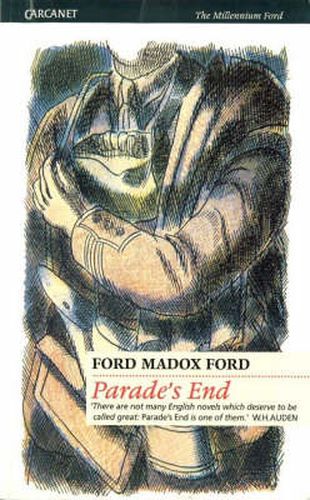Readings Newsletter
Become a Readings Member to make your shopping experience even easier.
Sign in or sign up for free!
You’re not far away from qualifying for FREE standard shipping within Australia
You’ve qualified for FREE standard shipping within Australia
The cart is loading…






Parade’s End is the title Ford Madox Ford gave to his greatest work, the four Tietjens novels which - in Graham Greene’s words - tell ‘the terrifying story of a good man tortured, pursued, driven into revolt, and ruined as far as the world is concerned by the clever devices of a jealous and lying wife’. He wanted to see the book printed in one volume: Some Do Not (1924), No More Parades (1925) and A Man Could Stand Up (1926), with his afterthought, The Last Post (1928). Christopher Tietjens is the last of a breed, the Tory gentleman, which the Great War, a savage marriage to Sylvia, and the qualities inherent in his nature, define and unravel. Here, the War’s attritions offered no escape from domestic witchcraft. Opposite Tietjens is Macmaster, a Scot, different in class and culture, at once friend and foil. Here, Ford’s art and his human vision achieve their greatest complexity and subtlety. Gerald Hammond is Professor of English at the University of Manchester, author of The Making of the English Bible , Fleeting Things and other critical volumes and editor of the Selected Poems of John Skelton and of Richard Lovelace in the FyfieldBooks series. This volume is part of The Millennium Ford project which aims to bring all the major writings of this great writer back into circulation.
$9.00 standard shipping within Australia
FREE standard shipping within Australia for orders over $100.00
Express & International shipping calculated at checkout
Parade’s End is the title Ford Madox Ford gave to his greatest work, the four Tietjens novels which - in Graham Greene’s words - tell ‘the terrifying story of a good man tortured, pursued, driven into revolt, and ruined as far as the world is concerned by the clever devices of a jealous and lying wife’. He wanted to see the book printed in one volume: Some Do Not (1924), No More Parades (1925) and A Man Could Stand Up (1926), with his afterthought, The Last Post (1928). Christopher Tietjens is the last of a breed, the Tory gentleman, which the Great War, a savage marriage to Sylvia, and the qualities inherent in his nature, define and unravel. Here, the War’s attritions offered no escape from domestic witchcraft. Opposite Tietjens is Macmaster, a Scot, different in class and culture, at once friend and foil. Here, Ford’s art and his human vision achieve their greatest complexity and subtlety. Gerald Hammond is Professor of English at the University of Manchester, author of The Making of the English Bible , Fleeting Things and other critical volumes and editor of the Selected Poems of John Skelton and of Richard Lovelace in the FyfieldBooks series. This volume is part of The Millennium Ford project which aims to bring all the major writings of this great writer back into circulation.